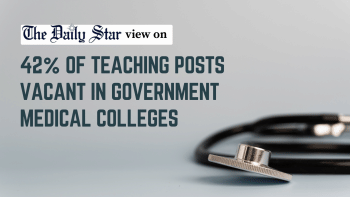Timely civil service recruitment is critical to its effectiveness

It is unacceptable that more than a quarter of the 19 lakh posts in civil administration lie vacant, a major reason behind the notoriously poor public services in our country. According to data from the Ministry of Public Administration (MoPA), there are 503,333 vacancies—26 percent of the total posts—as of December 2022. The percentage of vacant posts dropped from 22 percent in 2018 to 18 percent in 2021. However, it rose to a record high in 2022.
At the Ministry of Posts, Telecommunications and Information Technology, for example, there are 9,132 vacancies, which is almost half of its 20,191 posts. The Ministry of Health and Family Welfare has the highest number of vacancies (74,574), which perhaps explains why public healthcare services continue to be so bad. The Ministry of Primary and Mass Education has the second highest vacancies (44,790). Although officials at the MoPA claim that the crisis has been created because of recruitment delays caused by Covid-19 restrictions, such an excuse is unjustifiable. The actual reason behind recruitment not picking up pace has to do with bureaucratic tangles and lack of initiatives by the recruiting organisations.
While Class 1 and Class 2 officers are recruited in a relatively fair process by the Public Service Commission (PSC), according to officials, recruitment in the lower grades is often mired in irregularities. Allegations of corruption and nepotism in the recruitment process have become so rampant that top officials in many offices are reportedly reluctant to initiate recruitments. This, ironically, leads to more irregularities as those who have to pay Tk 10-15 lakh, for example, to get a job are naturally more inclined to indulge in bribery and corruption once hired.
There are other concerns as well. The top-heavy imbalance in civil bureaucracy, where the top posts have disproportionately gone up in number while the lower tiers remain slim, has led to a lack of productivity and accountability. Moreover, it is disconcerting to see how the administration has been giving in to demands for undue perks and promotions in vital positions, instead of filling in necessary vacancies in other positions. It is time for the government to implement meaningful civil service reforms so that vacancies in lower positions are filled regularly and through a transparent process, so that the public get services without any delay or hassles.


 For all latest news, follow The Daily Star's Google News channel.
For all latest news, follow The Daily Star's Google News channel. 










Comments